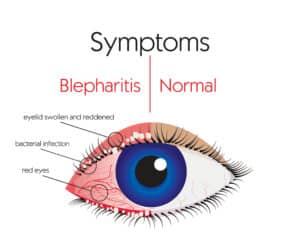Are your eyes dry, itchy, or gritty? Does it seem like they stay this way no matter what you do?
Dry eyes are a common issue that many people deal with. There are many reasons your eyes can feel too dry.
However, the main reason is usually an issue with tear production. Your eyes may have trouble producing tears because of your environment.
But you may also have dry eyes because of a more persistent, underlying issue. Either way, you can have dry eyes anytime, and the symptoms can last all year.
When you have dry eyes, your eyes may feel like they’re burning or gritty. They may also be watery and overproduce mucus, causing your eyelashes to stick together.
When these symptoms persist and don’t go away on their own, you should seek treatment from an eye care professional. Your dry eyes may be temporary, but they may also be caused by dry eye syndrome.
To understand how your eyes can feel dry all year and when it’s best to seek treatment, keep reading to learn what causes and contributes to dry eye symptoms and how to differentiate between temporary dry eye and dry eye syndrome.
Environmental Factors

One thing that can cause dry eyes in any season is dry air. It may be dry outside because of cold weather, but your home or workplace may also be dry during the warmer months due to air coming out of AC vents.
Heat can also dry out your eyes, as can dehydration, both of which are more common in the height of summer. But you can also become dehydrated any time of year, especially in the winter when you may drink less water when it’s colder.
UV rays from sunlight can also dry out your eyes any time of year, so your eyes can feel too dry if you don’t wear eye protection when it’s sunny out. A good rule of thumb is to always wear sunglasses whenever you’re outside, even if it’s cloudy.
During the spring, many people suffer from pollen allergies. Allergy symptoms affecting your eyes can exacerbate your dry eye symptoms by making them more inflamed and drier.
Virtually any time of year, environmental factors can trigger dry eye symptoms or make them worse. But even if your eyes feel drier during certain times of the year, you may suffer from symptoms even when it’s not considered allergy season.
Temporary Vs. Chronic Dry Eye

The various environmental conditions detailed above can give you dry eyes. But you can also have dry eyes due to an underlying medical condition called dry eye syndrome.
If you already have dry eye syndrome, certain environmental conditions can worsen your symptoms, but they aren’t the underlying cause. Dry eye syndrome is more common in older patients and women, particularly women amid hormonal changes.
It’s also more common in adults with skin conditions, particularly ones that cause inflammation. Eyelid inflammation, or blepharitis, is often associated with dry eye syndrome and can be triggered by several age-related skin conditions.
If you have dry eye symptoms, they may disappear once your environmental conditions change. For example, if you use a humidifier indoors and get plenty of water, you can counteract the effects of dry air and dehydration, allowing your eyes to produce tears again.
But if you have dry eye syndrome, you’ll still experience at least some dry eye symptoms, even if they aren’t as severe, because the underlying cause isn’t due to your environment. If you have dry eye symptoms that don’t go away when you change your setting, you should immediately see an eye care professional for diagnosis and treatment.
Dry Eye Syndrome Diagnosis

Your tears have three main components: mucus, water, and oil. All these components must be in balance to adequately hydrate your eyes.
When you don’t produce tears well, it usually isn’t due to a lack of tear production but rather an imbalance of a specific component. For example, the glands that produce the oil layer, the protective outermost layer of your tears, can become blocked.
These glands, called meibomian glands, are necessary because, without this oil layer, your tears evaporate too quickly. When you come to your eye doctor at Traverse City Eye with dry eye symptoms, they can often find the underlying cause of your dry eyes by taking samples of your tears to see how much of each tear component your eyes produce. They can then diagnose you with dry eye syndrome and recommend treatment accordingly.
Dry Eye Syndrome Treatment
Home Remedies
Before recommending prescription medication or in-office treatment, most eye doctors recommend simple lifestyle changes to balance your tear health. They may recommend over-the-counter artificial tears and nutritional supplements.
They may also recommend ways to keep your eyelids clear of bacteria to reduce inflammation, like using eyelid wipes, an eyelid scrub, or a cool compress. They may recommend professional treatments if these changes don’t alleviate your dry eye symptoms.

Prescription Eye Drops
Certain prescription eye drops can reduce inflammation more effectively than over-the-counter artificial tears. At Traverse City Eye, we offer two of these prescriptions: Restasis and Xiidra.
Amniotic Membrane Treatments
Amniotic membranes taken from the placenta can effectively reduce inflammation and aid in tear production. We offer two in-office amniotic membrane treatments: Prokera and Biotissue AmnioGraft.
Prokera uses an amniotic membrane that’s similar to a contact lens. The membrane is applied on top of your eye for a few days, helping your eyes heal by reducing inflammation and scarring.
A Biotissue AmnioGraft is a similar treatment, but you have the membrane surgically grafted onto the eye. This replaces existing tissue affected by mechanical dry eye, also called conjunctivochalasis, which affects your eye’s ability to hold tears.
The graft allows your eyes to hold tears again while also reducing overall inflammation.
TearCare
TearCare is another in-office treatment we offer that uses a device that emits gentle heat to soften clogged meibomian glands. By allowing oil to flow through these glands, TearCare treats meibomian dysfunction, rebalancing the composition of your tears.
Do you need to find a solution for your dry eyes? Today, request an appointment at Traverse City Eye in Traverse City, MI!
